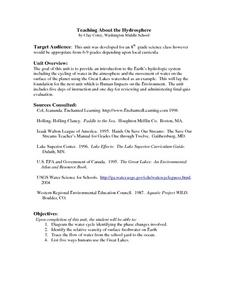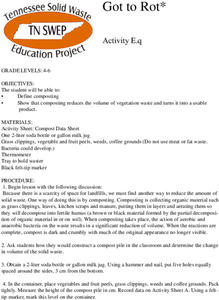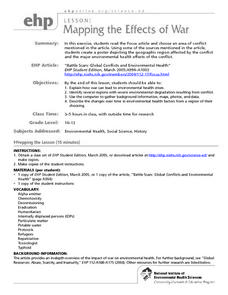Council for Economic Education
A Perfect Pet
Students read the story "The Perfect Pet". They examine how scarcity is a problem in society when people can not have everything they want which forces them to make (economic) choices.
Curated OER
Pollution Solutions: Earth Day
Eighth graders explore water pollution. In this stewardship instructional activity, 8th graders draw comparisons between potable and impaired waters. Students use the Learning Link website to examine ways people are fighting pollution...
Curated OER
Teaching About the Hydrosphere
Eighth graders are introduced to the Earth's hydrologic system including the cycling of water in the atmosphere and the movement of water on the surface of the planet using the Great Lakes watershed as an example.
Curated OER
Where Does the Water Go?
Students identify how the geography of the island of Maui influences the sources of water, identify/categorize the users of water on Maui after reading a series of news articles and construct a map of Maui displaying their findings.
Curated OER
Water Conservation
Students create short videos about water conservation using the computer program iMovie in this cross-curricular lesson provided by the Florida Center for Instructional Technology.
Curated OER
Water And EcoFluxx
Learners investigate the environmental concepts covered while playing the game of Eco Fluxx. They focus upon the supply of water found in aquifers and define how they are connected to the environment. Students discuss the playing of the...
Federal Reserve Bank
Lesson 1: Katrina Strikes
Most families have an emergency kit in their home with flashlights, water, and extra food. But what happens to your money when disaster strikes? An economics lesson focused on the aftermath of Hurricane Katrina in 2005 demonstrates the...
Illustrative Mathematics
Field Day Scarcity
Introduce young mathematicians to concepts of financial literacy with this open-ended word problem. With seven dollars to spend during field day and given a list of available items and their prices, children must determine how they want...
Curated OER
From Foraging to Farming
Sixth graders understand the basic needs of humans. In this basic needs lesson, 6th graders participate in an activity to search for their basic needs. Students recognize the problems when their is scarcity of a necessity to their lives....
Curated OER
Survival Extravaganza
Fifth graders discuss the effects of scarcity. In this survival activity, 5th graders use strategies that would help them survive in a survival situation. Students write letters about bears in need of help to survive. Students answer...
Curated OER
Oh Deer! and English Learner Writing Extensions
Learners follow deer through Yellowstone Park and record the number of deer from year to year. In this basic needs of deer lesson, students work in small groups and chart the number of deer each year and give explanations using as...
PricewaterhouseCoopers
Waste and Recycling: Recycling Paper
We take paper for granted, while thousands of trees are being made into the paper we toss in the trash. Start a dialogue about paper reduction and recycling in class, and share the negative effects paper production has on our ecosystem....
PricewaterhouseCoopers
Waste and Recycling: Recycling and Energy Recovery
Reduce, reuse, recycle, and recover. Young environmentalists learn about the overwhelming amount of garbage produced and discover better ways to minimize their impact on Earth by learning the difference between garbage and recyclables.
Curated OER
Reading Comprehension 1
Bring this non-fiction text into your eleventh and twelfth grade classrooms. Your high schoolers will read the long passage provided, and use the information to complete eight multiple-choice questions. The answer sheet details where one...
Curated OER
Observing the Nutritional Relationships in an Ecosystem
Make learning about food webs fun and fascinating for your fifth graders.
Curated OER
Antonyms 2
Delve deeper into word meaning by exploring a word's antonyms. For each of the 10 words listed, high schoolers must identify the correct antonym from a list of five options. Example words include boon, rapt, laggard, and imperceptible....
Curated OER
Got to Rot
Learners make their own compost in a 2-liter jug and determine the actual volume loss in the composted material over a six-month period.
Curated OER
Kalahari Explorations
Learners research the area of the Kalahari Desert. They use the online and print resources and evaluate the information they find. They present their information to the class.
Curated OER
Houghton Mifflin Social Studies/Chapter 13, Lesson 1 The Past Shapes the Future (pp. 292-295)
Fourth graders reflect upon the events of the past in order to make cognitive connections to present or future history. Students use Blooms Taxonomy to attain higher levels of thinking.
Curated OER
Mapping the Effects of War
Students examine how war can lead to environmental health crises. They read an article, conduct research on a region from the article, and create a poster to depict the geographic region and the environmental health effects of the conflict.
Curated OER
Ethical Consumer Choices in the Global Village
Students identify an issue and provide several reasons to support a position. They describe ways members of a community meet one another's needs. Students explain their roles, rights, and responsibilities within the community.
Curated OER
Exploration of North America
Fifth graders examine some famous explorers who have helped to discover our country. They discuss explorers from three countries today. They are: Spain, Portugal, and England.
CommonLit
Common Lit: Water Scarcity: A Global Issue
CommonLit.org is a wonderful resource to use in a Language Arts classroom. Each story or article is accompanied by guided reading questions, assessment questions, and discussion questions. In addition, students can click on words to see...
eSchool Today
E School Today: Your Cool Basics on Water Shortage
Despite seventy percent of the world's surface being covered with water, there is a potential shortage of this natural resource. Only a small percentage is fresh water and much of that is inaccessible or threatened. Learn about fresh...

























